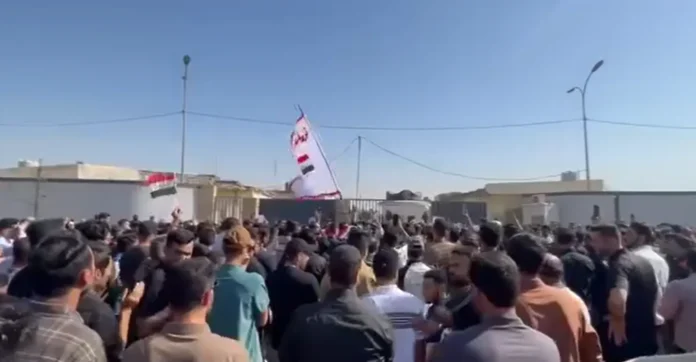Protests erupted across southern Iraq on Monday, fueled by the ongoing unpaid wages and water crisis. Demonstrators staged sit-ins and blocked major roads in Basra and Maysan. The unrest reflects growing frustration over government inaction on essential services and delayed salaries.
In Maysan, dozens of contract workers gathered outside the provincial council building. They demanded payment of salaries delayed for nine months. The protesters warned that the movement would escalate if the government failed to act promptly. Local officials told Shafaq News they will process the payments within a week and cover retroactive amounts. Despite this assurance, demonstrators vowed to continue their protest until they receive full payment.
Meanwhile, Basra experienced similar unrest. Residents of al-Deir maintained a sit-in for the third consecutive day. They blocked access to the Majnoon and al-Fayhaa oil fields, disrupting normal operations. The protest started last Thursday when locals shut down the main Baghdad–Basra highway. They cited severe water shortages and deteriorating living conditions as the driving factors.
The protest movement’s leader explained that residents struggle with acute water scarcity and rising salinity. They urged both central and local authorities to install an emergency water pipeline from al-Qurna. Alternatively, they asked authorities to activate the Japanese-funded water project to relieve shortages. The leader emphasized that without immediate intervention, the protests could expand to other areas.
Citizens across southern Iraq expressed growing frustration. Many complained about poor public services, unreliable electricity, and delayed government salaries. Analysts suggest that economic pressures and basic service failures fuel recurring demonstrations. Consequently, local governments face increasing pressure to address the unpaid wages and water crisis without further delay.
Protesters continued chanting and carrying banners demanding accountability. They blocked roads in several districts, causing traffic jams and interruptions in oil transport. Authorities increased security presence, but officials reported no major clashes so far.
Observers note that the protests highlight deeper structural problems in southern Iraq. Delays in salary payments, coupled with deteriorating water supplies, triggered widespread public dissatisfaction. Residents insist that urgent measures are necessary to prevent further escalation.
As demonstrations continue, the government faces mounting pressure. Officials must implement immediate solutions for the unpaid wages and water crisis to restore public trust and ensure stability in the south.


